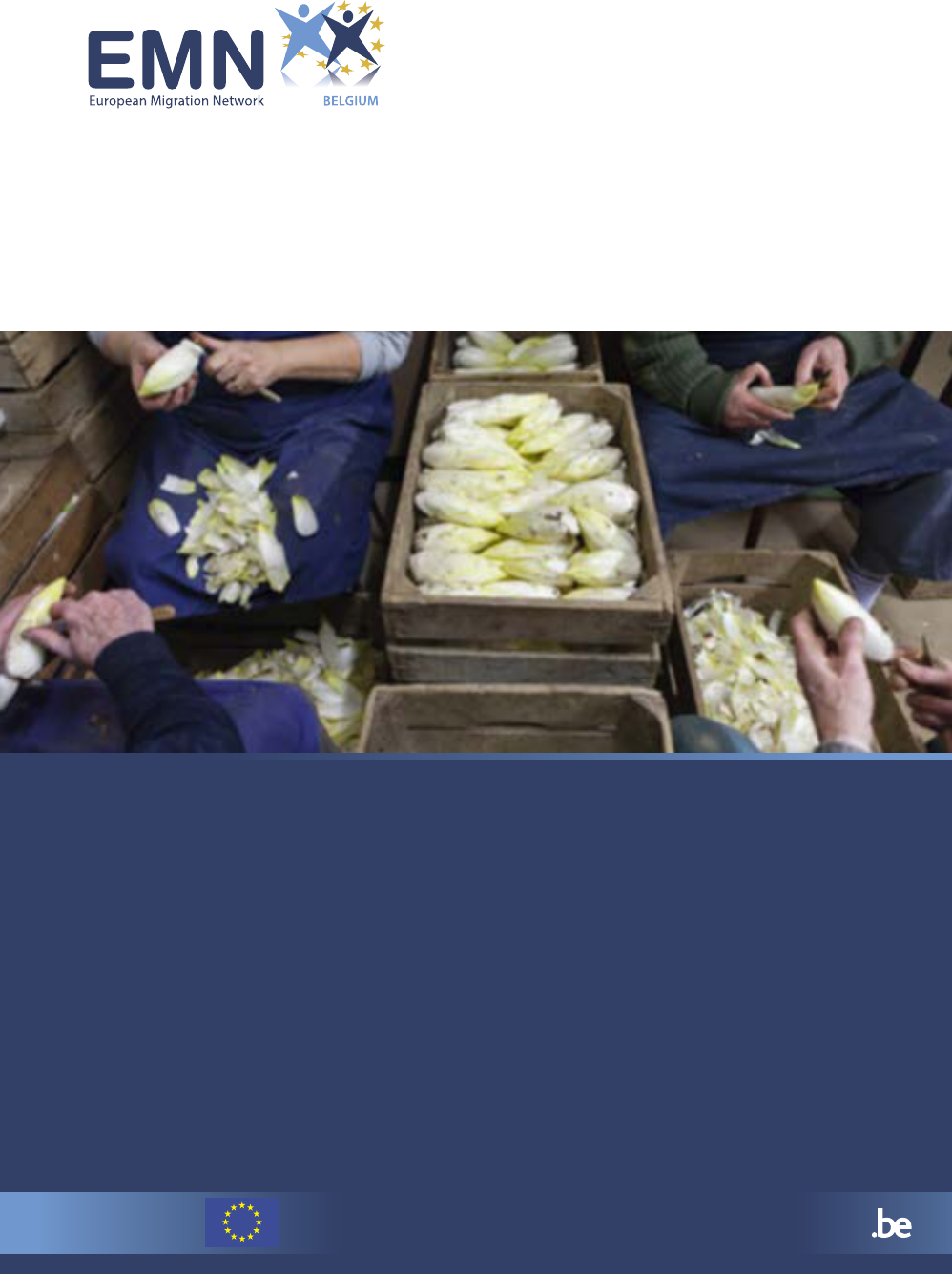
ATTRACTING AND PROTECTING THE
RIGHTS OF SEASONAL WORKERS IN BELGIUM
January 2021
Authors: Natali Afsar and Jo Antoons
(Fragomen Global LLP, Brussels)
This report was funded by
the European Union's Asylum
Migration and Integration Fund

32
The European Migration Network (EMN) is coordinated by the European Commission
with National Contact Points established in each EU Member State plus Norway.
The European Migration Network Belgium is a multi-institutional entity com-
posed of experts from the Immigration Ofce, the Ofce of the Commissioner
General for Refugees and Stateless Persons (CGRS), Myria - the Federal
Migration Centre, and Fedasil - the Federal Agency for the Reception of Asy-
lum Seekers. It is coordinated by the Federal Public Service Home Affairs.
EDITORIAL STAFF
Jessy Carton, Camille De Brabant-Bibi, Bram Devos,
Martine Hendrickx, Isabelle Raes, Bieke Vens
RESPONSIBLE PUBLISHER
Philippe Rosseel
EMN BELGIUM
Federal Public Service Home Affairs
1 Rue de Louvain / Leuvenseweg 1
1000 Brussels
BELGIUM
www.emnbelgium.be

54
BELGIAN STUDY AND EU COMPARATIVE STUDY
Belgian report:
This is the Belgian contribution to the EMN Study “Attracting and protect-
ing the rights of seasonal workers in the EU”. Other National Contact Points
(NCPs) produced a similar report on this topic for their (Member) State.
Common Template and Synthesis Report:
The different national reports were prepared on the basis of a common
template with study specications to ensure, to the extent possible, com-
parability.
Synthesis report:
On the basis of the national contributions of 25 NCPs, a Synthesis Report
was produced by the EMN Service Provider in collaboration with the Euro-
pean Commission and the EMN NCPs. The Synthesis Report gives an
overview of the topic in all the (Member) States.
Scope and aim of the study:
The study primarily covers third-country nationals who enter and reside in
Belgium for the purpose of seasonal work in the framework of the Seasonal
Workers Directive 2014/36/EU. The study reects the most recent develop-
ments in terms of legislation and policy on seasonal work in Belgium, largely
focussing on 2019. Developments in earlier years are also considered if rel-
evant.
Available on the website:
The Belgian report, the Synthesis report and the links to the reports of the
other (Member) States are available on www.emnbelgium.be.

TABLE
OF CONTENTS
76
TABLE OF CONTENTS
1. INTRODUCTION 9
2. PROFILE OF SEASONAL WORKERS 17
2.1. Admission of seasonal workers from third countries under the Directive 18
2.2. Sectors covered by the Seasonal Workers Directive 19
2.3. Personal characteristics of seasonal workers 20
2.4. Salary of seasonal workers 21
2.5. Average duration of stay of seasonal workers 23
2.6. Seasonal work and irregular migrants 23
3. POLICIES AND PROCEDURES FOR SEASONAL WORK IN BELGIUM 25
3.1. Importance of seasonal workers for the labour market 26
3.2. Fees and duration of the procedure 28
3.3. Labour market test 29
3.4. Facilitation of re-entry 29
3.5. Change of status 30
3.6. Relevant actors in promoting seasonal work 31
3.7. Information provided to employers 32
4. PROTECTION AND RIGHTS OF SEASONAL WORKERS 35
4.1. Equal treatment of seasonal workers 36
4.2. Access to adequate housing 38
4.3. Key actors ensuring the protection of rights 39
4.4. Complaints against employers 40
4.5. Sanctions against employers 40
4.6. Other mechanisms ensuring the protection of rights 41
5. CONCLUSIONS 43
6. ANNEXES 47
A ANNEX A: References 48
B ANNEX B: Studies and reports
of the Belgian contact point of the EMN (2009-2018)
52
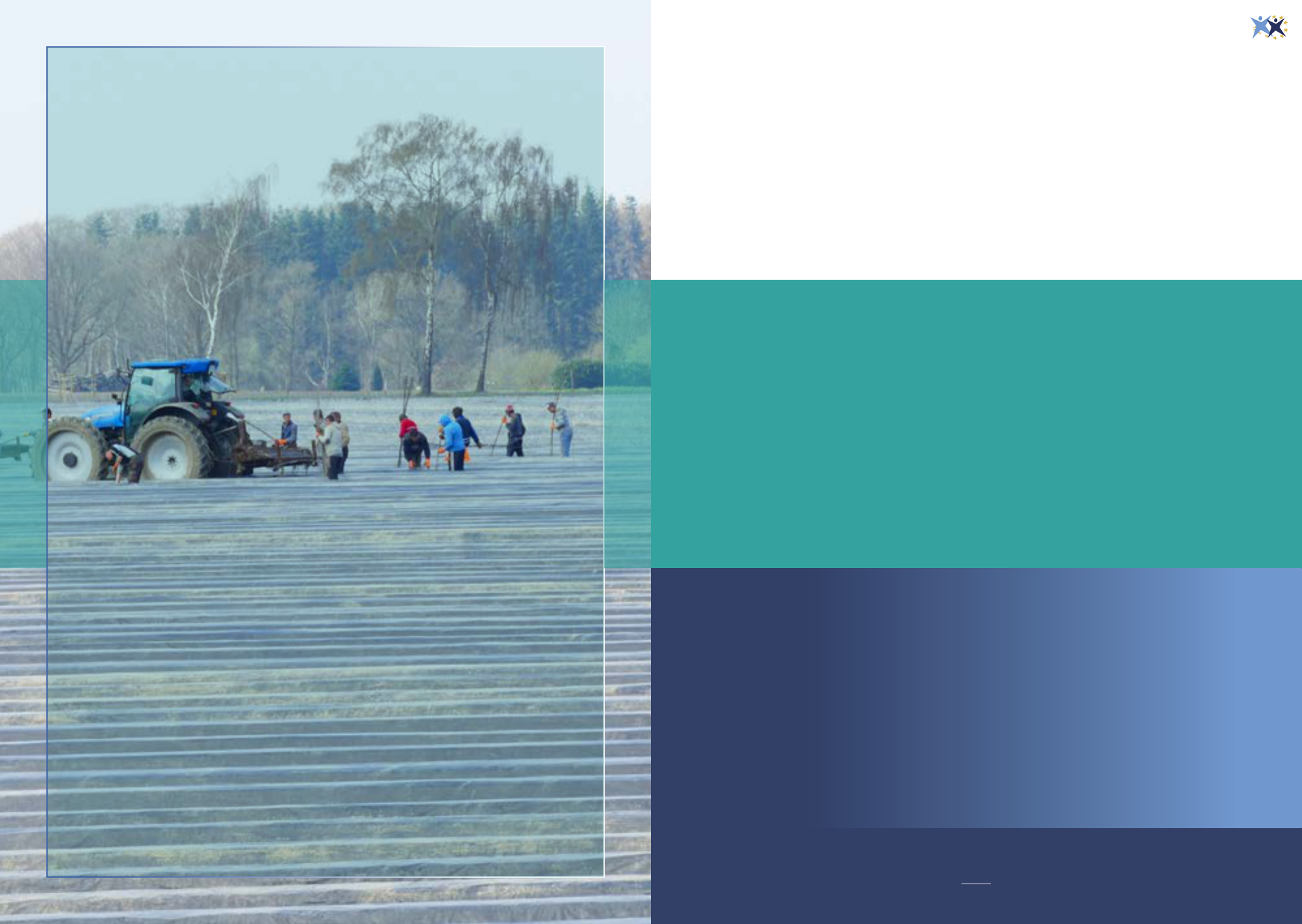
9
INTRODUCTION
01
ATTRACTING AND PROTECTING THE
RIGHTS OF SEASONAL WORKERS IN BELGIUM

1110
2019.
6
The German-speaking Commu-
nity adopted some specic measures by
Decision of 23 May 2019.
7
The Flemish
and the Walloon Regions decided that
the agriculture, the horticulture and the
hospitality sectors will be covered by the
Directive. In the German-speaking Com-
munity, the agriculture and the hospitality
sectors are covered by the Directive. The
Brussels region limited the coverage of
the Directive to the agriculture sector.
The Seasonal Workers Directive entered
into force in Belgium on 1 September
2019.
8
On 30 October 2019, the Com-
mission withdrew its action against
Belgium before the European Court of
Justice for failing to implement the Sea-
sonal Workers Directive.
Although formally the Directive entered
into force on 1 September 2019, a piece
of the regulatory puzzle with respect to
stay and residency was missing. That
nal piece was only implemented at Fed-
eral level with the Royal Decree of 23
March 2020.
9
At the time of this study, only the Flemish
Region had issued work authorisations
to seasonal workers under the Directive
(in total, 110 seasonal workers had been
admitted between the Directive’s imple-
mentation on 1 September 2019 and 27
May 2020). No seasonal workers had
been admitted in Wallonia, Brussels or
the German-speaking Community under
the Directive since 1 September 2019.
As regards the situation before the entry
into force of the Directive on 1 Septem-
ber 2019, there was no specic scheme
in place for workers from third countries
coming to Belgium to perform seasonal
work. Seasonal workers would in prin-
ciple fall within the ’general’ category of
third-country workers, i.e. workers from
third countries subject to obtaining a
work permit called ’permit B’, which was
granted for a period of employment up
to maximum 12 months, linked to a spe-
cic employer, and contingent upon a
labour market test. The Flemish Region
mentioned that in practice, before the
implementation of the Directive, work
authorisations for the purpose of season-
al work were mostly granted to workers
falling within another category, namely
third-country nationals with a long-term
resident status in another EU Member
State coming to perform an activity for
which the regional authority considers
there is a shortage of workers.
10
Only the Flemish Region could provide
statistical data related to work permits
obtained for seasonal work before 1 Sep-
tember 2019. No such data was kept by
Until 2014, Belgium’s federal gov-
ernment was responsible for the
development of all immigration-relat-
ed legislation and policies, including the
legislation and the policies for admitting
seasonal workers from third countries.
On 1 July 2014, the employment-based
immigration policies were transferred to
the regions: the Flemish, the Walloon and
the Brussels-Capital Region.
1
Belgium’s
regional governments hence became
competent to develop their own work
permit policies. Nonetheless, the federal
government kept a role in the process.
The Federal Public Service Home Affairs,
through the Immigration Ofce, remains
responsible for the issuance of residence
permits to third-country nationals.
The context of this transfer of competence
and its practical implementation, together
with Belgium’s complicated state struc-
ture and political landscape made that
the Single Permit Directive (2011/98/
EU) was only implemented in Belgium in
January 2019, long after the deadline of
25 December 2013. The implementation
of the other EU directives related to eco-
nomic migration, including the Seasonal
Workers Directive (2014/36/EU) (herein-
after ‘the Directive’) was therefore equally
delayed. In November 2016, the Com-
mission sent a letter of formal notice to
Belgium, followed by a reasoned opinion
in July 2017. On 19 July 2018, as the Bel-
gian government had still not transposed
the Directive, the European Commission
introduced an infringement procedure
against Belgium before the European
Court of Justice for failing to fully imple-
ment the Directive and proposed a daily
penalty of €49 906,50.
2
Only at the end of 2018 Belgium initi-
ated the implementation process. On
6 December 2018, the regions and the
federal authority concluded an Execut-
ing Cooperation Agreement dening the
common framework for the transposition
of the Directive in Belgium (hereinafter
‘the Executing Cooperation Agreement’).
3
This general framework was transposed
into the Belgian Immigration Act (herein-
after ‘the Immigration Act’) by a federal
law adopted on 5 May 2019.
4
In paral-
lel to this common framework agreed on
and laid down in the Immigration Act,
the regions have in turn adopted a Deci-
sion implementing the Directive. Each
Decision refers to the common rules laid
down in the Immigration Act and sets
out the specic measures applicable
in their region, including to which eco-
nomic sector(s) the provisions will apply.
The Flemish Region adopted its Deci-
sion on 7 December 2018,
5
the Brussels
and Walloon Region have each adopt-
ed their respective Decisions on 16 May
INTRODUCTIONINTRODUCTION
6. Decisionof 16 May 2019 of theGovernmentof the Brussels-Capital Region amending the Royal Decree of 9 June 1999 imple-
menting the Law of 30 April 1999 relating to the occupation of foreign workers, with regard to work authorisation for activities
carried out within the framework of an intra-group transfer, seasonal worker, researcher, trainee, volunteer, or within the frame-
work of the European Blue Card, Belgian Ofcial Gazette, 4 June 2019; Decision of 16 May 2019 of the Walloon Government
relating to the occupation of foreign workers and repealing the Royal Decree of 9 June 1999 implementing the Law of 30 April
1999 relating to the occupation of foreign workers, Belgian Ofcial Gazette, 19 June 2019.
7. Decision of 23 May 2019 of the German-speaking community amending the Royal Decree of 9 June 1999 implementing the Law
of 30 April 1999 relating to the occupation of foreign workers, Belgian Ofcial Gazette, 8 July 2019.
8. Executing Cooperation Agreement of 28 May 2019 between the federal state, the Walloon region, the Flemish region, the Brus-
sels-Capital region and the German-speaking community implementing the Cooperation agreement of 2 February 2018 be-
tween the federal state, the Walloon region, the Flemish Region, Brussels-Capital Region and the German-speaking Community
on the coordination of policies for the granting of work permits and the granting of residence permits, as well as norms relating to
the employment and stay of foreign workers, Belgian Ofcial Gazette, 18 July 2019.
1. On 1 January 2016, the Walloon Region transferred its employment-related competences to the German-speaking Community.
2. TEuropean Commission, Legal migration: Commission refers Belgium to the Court of Justice for failing to provide common rules
for non-EU seasonal workers, 19 July 2018, https://ec.europa.eu/commission/presscorner/detail/en/IP_18_4490; European Com-
mission v Kingdom of Belgium - Case C-676/18.
3. Executing Cooperation Agreement of 6 December 2018 between the federal state, the Walloon region, the Flemish region, the
Brussels-Capital region and the German-speaking community implementing the cooperation agreement of 2 February 2018 be-
tween the federal state, the Walloon region, the Flemish Region, Brussels-Capital Region and the German-speaking Community
on the coordination of policies for the granting of work permits and the granting of residence permits, as well as norms relating to
the employment and stay of foreign workers, Belgian Ofcial Gazette, 18 July 2019.
4. Law of 5 May 2019 modifying the Law of 15 December 1980 regarding the entry, residence, settlement and removal of foreign
nationals, Belgian Ofcial Gazette, 22 August 2019.
5. Decision of 7 December 2018 of the Flemish Government implementing the Law of 30 April 1999 on the employment of foreign
workers, Belgian Ofcial Gazette, 21 December 2018.

1312
the Walloon Region, the Brussels region
and the German-speaking Community.
As a result, this study will mostly provide
an overview of the legislative transposi-
tion of the Directive into Belgian law with
a limited insight on the practical aspects
and consequences of the measures
adopted.
It is worthwhile stating that Belgium
does not rely on seasonal workers from
third-countries to ll its labour mar-
ket needs. The majority of the seasonal
workers in Belgium come from other EU
Member States, mainly Bulgaria, Poland
and Romania. As a result, no specif-
ic measures are or have been in place
to attract seasonal workers from third
countries.
INTRODUCTION INTRODUCTION
IMPACT OF COVID-19 ON SEASONAL WORK IN BELGIUM
11
As a result of the Covid-19 outbreak, Belgium closed its borders to all
non-essential travel. However, the agricultural and horticultural sectors
were declared to be essential sectors,
12
and consequently, the govern-
ment decided to authorise the entry of seasonal workers in the country to
avoid labour shortages during the upcoming harvest seasons.
13
In practice,
however, it was reported that seasonal workers initially faced issues with
entering the country, on the one hand due to the border closure of other
countries such as Germany and Hungary, and on the other hand as a result
of miscommunications with the Belgian border security ofcers.
14
To counter this problem, the Federal Public Service Employment, Labour
and Social Dialogue
15
issued a template certicate for seasonal workers
coming to Belgium to perform seasonal work. This document, to be pre-
sented as proof for seasonal workers crossing the border, was translated
into Romanian, Polish, Bulgarian and Hungarian. In addition, on 30 April
2020, a government communication
16
was sent to border controllers and
embassies to remind them that seasonal workers were allowed to travel to
Belgium to work.
On 9 April 2020, the federal government adopted several measures by
Royal Decree in order to respond to the shortage of seasonal workers in the
agriculture and horticulture sectors resulting from the Covid-19 outbreak.
17
From 1 March 2020, seasonal workers working in the agriculture and the hor-
ticulture sectors were allowed to work twice the number of days per year they
would normally be allowed to under the seasonal work scheme applicable in
these sectors: 60 days instead of 30 in the agriculture sector, 130 days instead
of 65 in the horticulture sector, and 200 days instead of 100 in some specic
9. Royal Decree of 23 March 2020 modifying the Royal Decree of 8 October 1981 implementing the Law regarding the entry,
residence, settlement and removal of foreign nationals, Belgian Ofcial Gazette, 7 May 2020.
10. Art. 9 20° of the Royal Decree of 9 June 1999 implementing the Law of 30 April 1999 relating to the occupation of foreign
workers, Belgian Ofcial Gazette, 26 June 1999.
11. This study only discusses Covid-19 measures taken up until June 2020.
12. Ministerial Decision of 3 April 2020 modifying the Ministerial Decision of 23 March 2020 on emergency measures to limit
the spread of the Covid-19, Belgian Ofcial Gazette, 3 April 2020.
13. Art. 20 Decision of 16 May 2019 of the Walloon Government relating to the occupation of foreign workers and repealing the
Royal Decree of 9 June 1999 implementing the Law of 30 April 1999 relating to the occupation of foreign workers, Belgian
Ofcial Gazette, 19 June 2019 ; Art. 23 Decision of 7 December 2018 of the Flemish Government implementing the Law of
30 April 1999 on the employment of foreign workers, Belgian Ofcial Gazette, 21 December 2018.
14. Art. 29 Decision of 23 May 2019 of the German-speaking community amending the Royal Decree of 9 June 1999 imple-
menting the Law of 30 April 1999 relating to the occupation of foreign workers, Belgian Ofcial Gazette, 8 July 2019.
15. FR: Service public fédéral Emploi, Travail et Concertation sociale; NL: Federale Overheidsdienst Werkgelegenheid, Arbeid en
Sociaal Overleg.
16. Joint communication of 30 April 2020 by the Deputy Prime Minister and Minister of Justice, Koen Geens, the Minister of
Social Affairs and Public Health, and Asylum and Migration Maggie De Block, and the Minister of Employment, the Economy
and Consumers, Nathalie Muylle.
17. Royal Decree n. 5 of 9 April 2020 modifying certain rules applicable in the agricultural and horticultural sectors in the frame-
work of Covid-19 measures, Belgian Ofcial Gazette, 20 April 2020.

1514
INTRODUCTION INTRODUCTION
horticultural sectors. From 1 April 2020, the number of days of seasonal work
allowed in the fruit sector was also extended under certain conditions.
Under the Belgian seasonal work scheme, it is prohibited to work as a sea-
sonal worker if in the past 180 calendar days, the worker has worked as
an employed worker in the agriculture, horticulture or landscaping sector.
This rule is commonly referred to as the ‘180-day rule’. From 1 April 2020,
the 180-day rule was limited to the work carried out within one company.
In other words, a person who had worked as an employed worker in a dif-
ferent sector or for a different company in the agricultural or horticultural
sector over the past 180 calendar days was now able to work as a seasonal
worker for another company.
Even though these measures applied to all sexasonal workers, both nation-
als and non-nationals, they specically aimed at retaining foreign seasonal
workers already working in Belgium in order to meet the needs of the
agriculture and horticulture sectors in light of the harvest season for straw-
berries, asparagus, and other fruits and vegetables.
18
In addition to the above mentioned changes brought to the seasonal work
scheme, the federal government also took measures to temporarily suspend
the waiting period of 4 months for applicants of international protection
to take up jobs in sectors dened as essential in the context of Covid-19,
including agriculture and horticulture.
19
A specic measure was also taken for students working in Belgium, irre-
spective of their nationality. As a general rule, students in Belgium can
work at reduced social security contributions during the rst 475 hours of
work. After the Covid-19 outbreak however, the government decided that
the hours worked in the second quarter of 2020 would not be taken into
account. The measure applied to students working in any economic sector,
including agriculture and horticulture.
20
Finally, temporary tax exemption measures were adopted to support eco-
nomic “critical sectors”, including the agriculture and horticulture sectors
suffering from the shortage of seasonal workers.
21
18. Ibidem, see recitals.
19. Art. 3 of the Special Powers Decree n. 14 of 27 April 2020 taken in execution of Article 5, § 1, 5° of the Law of 27 March 2020
granting powers to the King in order to take measures in the ght against the spread of the coronavirus Covid-19 (II) aimed at
ensuring the proper organization of work in critical sectors, Belgian Ofcial Gazette, 28 April 2020.
20. Art. 6 of the Special Powers Decree n. 14 of 27 April 2020.
21. Art. 16 Law of 29 May 2020 laying down various urgent tax measures due to the Covid-19 pandemic, Belgian Ofcial Gazette,
11 June 2020.
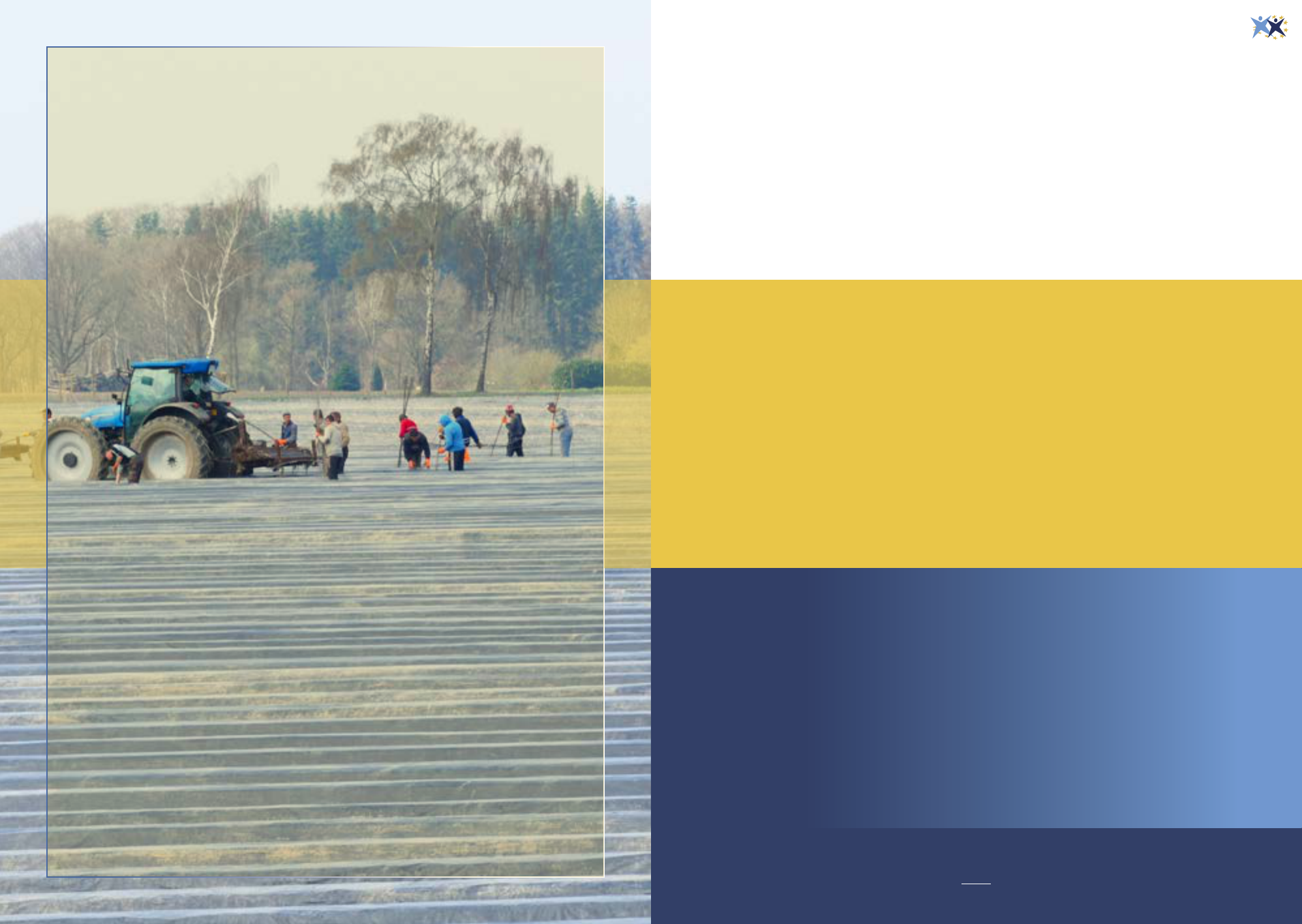
17
PROFILE OF
SEASONAL WORKERS
02
ATTRACTING AND PROTECTING THE
RIGHTS OF SEASONAL WORKERS IN BELGIUM

1918
2.2.
SECTORS COVERED BY
THE SEASONAL WORKERS
DIRECTIVE
22
Prior to discussing the sectors covered
by the Directive, it is worth recalling that
economic migration is a regional com-
petence in Belgium. As explained in the
introduction above, the federal govern-
ment transferred its competence on
employment-based immigration poli-
cies to the regional authorities on 1 July
2014, but remained itself competent for
the issuance of residence permits.
For this reason, the regions and the federal
authority concluded an Executing Coop-
eration Agreement on 6 December 2018
dening the general framework for the
transposition of the Directive in Belgium.
The Executing Cooperation Agreement
provides that the regions should each
decide to which sector(s) the Direc-
tive applies within their jurisdiction.
23
The Flemish and the Walloon Region
decided that agriculture, horticulture
and hospitality would be covered by
the Directive.
24
In the German-speaking
Community, only agriculture and hospi-
tality are covered by the Directive.
25
Finally, the Brussels-Capital Region lim-
ited the coverage of the Directive to the
agriculture sector,
26
as the region did not
intend to attract seasonal workers from
third countries to its metropolitan area.
The region stated that it had opted for a
restrictive interpretation of the Directive
not so much to favour national work-
ers, but rather to prevent the use of the
seasonal work scheme by employers to
the detriment of other, less precarious
schemes where possible.
Before the entry into force of the Sea-
sonal Workers Directive on 1 September
2019, there was no specic scheme in
place for workers from third countries
coming to Belgium to perform season-
al work. Such seasonal workers would
in principle fall within the ‘general’ cat-
egory of third-country nationals subject
to obtaining a work permit type B. This
permit was granted for a period of
employment up to 12 months, linked to a
specic employer, and contingent upon a
labour market test.
This section discusses the proles of
seasonal workers from third countries
working and staying in Belgium. Atten-
tion is paid to the economic sectors
open to seasonal work by third-country
national workers and the personal char-
acteristics of these workers, as well as to
their minimum salaries and the average
duration of their stay. The nal part briey
explores the possible linkages between
seasonal work and irregular migration.
Recent data are provided where availa-
ble.
2.1.
ADMISSION OF SEASONAL
WORKERS FROM THIRD
COUNTRIES UNDER
THE DIRECTIVE
From the implementation of the Directive
on 1 September 2019 until 27 May 2020,
110 seasonal workers had obtained a
work authorisation in the Flemish Region
on the basis of the Directive. During this
period, no third-country seasonal work-
ers had been admitted in the Brussels
Capital Region, the Walloon Region and
the German-speaking Community.
PROFILE OF SEASONAL WORKERSPROFILE OF SEASONAL WORKERS
22. Art. 2(2) Seasonal Workers Directive.
23. Art. 14 Executing Cooperation agreement of 6 December 2018.
24. Art. 20 Decision of 16 May 2019 of the Walloon Government relating to the occupation of foreign workers and repealing the
Royal Decree of 9 June 1999 implementing the Law of 30 April 1999 relating to the occupation of foreign workers, Belgian Ofcial
Gazette, 19 June 2019 ; Art. 23 Decision of 7 December 2018 of the Flemish Government implementing the Law of 30 April
1999 on the employment of foreign workers, Belgian Ofcial Gazette, 21 December 2018.
25. Art. 29 Decision of 23 May 2019 of the German-speaking community amending the Royal Decree of 9 June 1999 implementing
the Law of 30 April 1999 relating to the occupation of foreign workers, Belgian Ofcial Gazette, 8 July 2019.
26. Art. 30/2 1° Decision of 16 May 2019 of the Government of the Brussels-Capital Region amending the Royal Decree of 9 June
1999 implementing the Law of 30 April 1999 relating to the occupation of foreign workers, with regard to work authorisation for
activities carried out within the framework of an intra-group transfer, seasonal worker, researcher, trainee, volunteer, or within the

2120
GENDER DISTRIBUTION
As regards gender distribution, data
could only be provided by the Flemish
Region. Out of the 74 seasonal workers
that were granted a work authorisation
in 2018, only 6 seasonal workers were
women, the rest of the workers were
men.
SKILLS LEVEL
At present, there are no data available
on the skills levels of seasonal workers in
Belgium, e.g. with regard to their educa-
tion or qualication level, language level
or experience as seasonal worker.
2.4.
SALARY OF
SEASONAL WORKERS
There are no data available on the aver-
age salary of seasonal workers from third
countries in Belgium.
In 2020, the minimum salary in Bel-
gium was €1 593,81 per month (based
on a 38-hour week contract). However,
specic minimum hourly salaries apply
to seasonal workers in Belgium. These
minimum hourly salaries are set by the
applicable sectorial collective labour
agreement.
In the agriculture sector, for 2020, the
minimum hourly wage for workers
including seasonal workers was €9,45.
An exception applied to workers work-
ing in the cultivation of ax and hemp
for who the minimum hourly salary was
€13,19.
28
In the horticulture sector, the minimum
hourly wage for 2020 varied between
€9,26 and €11,33, depending on the
sub-sector (e.g. €9,26 in fruit growing,
€10,12 in oriculture, €11,25 in silvi-
culture, €11,33 in tree nurseries).
29
This
wage applies to all workers in the sector
including seasonal workers.
In the hospitality sector, the minimum
hourly wage is also set by a sectorial col-
lective labour agreement.
30
The collective
labour agreement for the hospitality sec-
tor provides each year a detailed list of
the existing jobs in the sector and deter-
2.3.
PERSONAL CHARACTERISTICS
OF SEASONAL WORKERS
TOP COUNTRIES OF ORIGIN
Only the Flemish Region could provide
data on work authorisations issued for
seasonal work in 2018. In total, 74 work
authorisations were granted to sea-
sonal workers in the Flemish Region in
2018. Half of these authorisations (37)
were granted to Indian nationals. For 20
work authorisations, the nationality of
the seasonal worker was not identied
in the regional database. The rest of the
authorisations granted (17) were split
between nine different countries (Bang-
ladesh, Ghana, Kosovo, Mali, Morocco,
Nepal, Nigeria, Pakistan and Sri Lanka).
The Walloon Region, the Brussels Region
and the German-speaking Communi-
ty could not provide any statistical data
related to work permits obtained for sea-
sonal work before 1 September 2019.
It is worthwhile stating that Belgium
does not rely on seasonal workers from
third countries to ll labour market needs.
The small number of work authorisations
issued in the Flemish Region (110 work
authorisations issued in total between 1
September 2019 and 27 May 2020 for
the purpose of seasonal work) and the
lack of applications for seasonal work in
the other regions since the implemen-
tation of the Directive on 1 September
2019 illustrates this fact. The majority of
seasonal workers in Belgium are nation-
als from other EU Member States, mainly
Bulgaria, Poland and Romania.
27
The regions conrmed that since nation-
als from Bulgaria, Poland and Romania
have access to the Belgian job market, no
signicant number of work authorisation
applications have been led for seasonal
work in Belgium in the past years.
AGE GROUPS
Only the Flemish Region could provide
data related to the age of beneciaries of
work authorisations issued for seasonal
work in 2018. For the 74 work authori-
sations granted, the main age group was
45-49 (15 workers), followed by 35-39
(14 workers).
NUMBER OF
WORK AUTHORISATIONS
GRANTED BY
THE FLEMISH REGION
TO SEASONAL WORKERS
IN 2018 BY NATIONALITY
India 37
Ghana 3
Nepal 3
Bangladesh 2
Kosovo 2
Morocco 2
Nigeria 2
Mali 1
Pakistan 1
Sri Lanka 1
Unknown 20
Total 74
PROFILE OF SEASONAL WORKERSPROFILE OF SEASONAL WORKERS
28. Art. 1 and 2 of the Collective labour agreement of the Joint Committee on agriculture of 9 December 2019.
29. Art. 2 of the Collective labour agreement of the Joint Committee for companies in the horticulture sector of 9 December 2019.
30. Collective labour agreement for the hospitality sector of 14 April 2008.
27. Information provided by the Fédération Wallonne de l’Agriculture and conrmed by the Walloon Region.

2322
mines to which category (between I
and IX) each listed job belongs to. The
minimum hourly salary depends on the
category to which the seasonal worker
belongs to as well as their seniority level.
For 2020, the minimum hourly salary
for a seasonal worker in the hospitality
sector with one year of seniority var-
ied between €12,1504 (for category
I workers, e.g. cafeteria workers) and
€18,0369 (for category IX workers, e.g.
kitchen chefs). Specic and slightly more
advantageous calculation methods apply
to seasonal workers in the hospitali-
ty sector.
31
These particular calculation
methods are dened in the sectorial col-
lective labour agreement. For instance,
seasonal workers starting a new job will
enter in year one of seniority level after
performing 130 days of work, and year
two of seniority level after performing
390 days of work.
32
The abovementioned minimum sala-
ries are gross salaries from which social
security contributions and tax withhold-
ings must in principle be deducted.
As a general rule, reduced social security
contributions apply to seasonal workers,
which are calculated on the basis of a
low xed (standard) daily income instead
of the actual income, and determined by
the applicable sectorial agreement (e.g.,
in the agriculture sector, an amount of
€2,70 per working day must be deducted
as social contributions).
33
The vast major-
ity of seasonal workers also benet from
the application of a special social security
scheme (called the “work bonus”) aim-
ing to guarantee a higher net salary for
workers with low wages. The application
of these special schemes usually leads to
very low to non-existent social security
contributions for seasonal workers.
In addition to social security contribu-
tions, a withholding tax on professional
income must also be deducted from the
gross salary. No specic tax provisions
are in place for seasonal workers: they are
taxed on their actual income (as opposed
to a standard income for social security
contributions). In most cases, the with-
holding tax applied to seasonal workers’
income in the agriculture and horticulture
sectors is 11,11 %, and 33,31% in the
hospitality sector.
The abovementioned rules related to
social security and tax contributions
applicable to seasonal workers are only
general rules indicated here to provide
a broad overview on the net income of
seasonal workers in Belgium. The Bel-
gian seasonal workers scheme is highly
technical with many exceptions that are
beyond the scope of this study.
PROFILE OF SEASONAL WORKERSPROFILE OF SEASONAL WORKERS
2.5.
AVERAGE DURATION OF STAY
OF SEASONAL WORKERS
There are no data available on the aver-
age duration of stay of seasonal workers,
nor on the periods of the year for which
their work authorisations are granted.
According to the Fédération Wallonne de
l’Agriculture, the regions need seasonal
workers all year long, but more in particu-
lar during spring, summer and autumn.
The peak season depends on the specif-
ic sector. Winter is considered to be the
only off-peak period for seasonal work in
Belgium, although in some sectors, such
as the Christmas trees sector, the high
season is winter.
For the hospitality sector, summer is the
peak season in Belgium.
2.6.
SEASONAL WORK
AND IRREGULAR MIGRANTS
According to the Belgian labour inspec-
tion services, few cases of seasonal
work performed by irregular migrants
have been detected in the past years.
Between 1 January 2018 and 25 June
2020, out of 1136 inspections conduct-
ed on 10 640 workers in the agriculture
sector (not limited to seasonal workers),
only 26 cases of illegal work have been
reported (18 cases of workers without a
valid work permit and 8 cases of workers
without a valid residence permit).
Fairwork Belgium, the main Belgian
non-prot organisation defending the
rights of illegal workers, has conrmed
that they have received no requests for
assistance from irregular migrants per-
forming seasonal work in Belgium in
recent years.
28. Art. 1 and 2 of the Collective labour agreement of the Joint Committee on agriculture of 9 December 2019.
29. Art. 2 of the Collective labour agreement of the Joint Committee for companies in the horticulture sector of 9 December 2019.
30. Collective labour agreement for the hospitality sector of 14 April 2008.
31. Art. 15 of the Collective labour agreement for the hospitality sector of 14 April 2008.
32. This applies to seasonal workers who have performed the same job function for 130 days for the same employer under a ve-day
per week work schedule (Art. 15 §2 of the Collective labour agreement for the hospitality sector of 14 April 2008).
33. Article 2/1 of the Belgian Social Security Act of 27 June 1969, Belgian Ofcial Gazette, 25 July 1969.
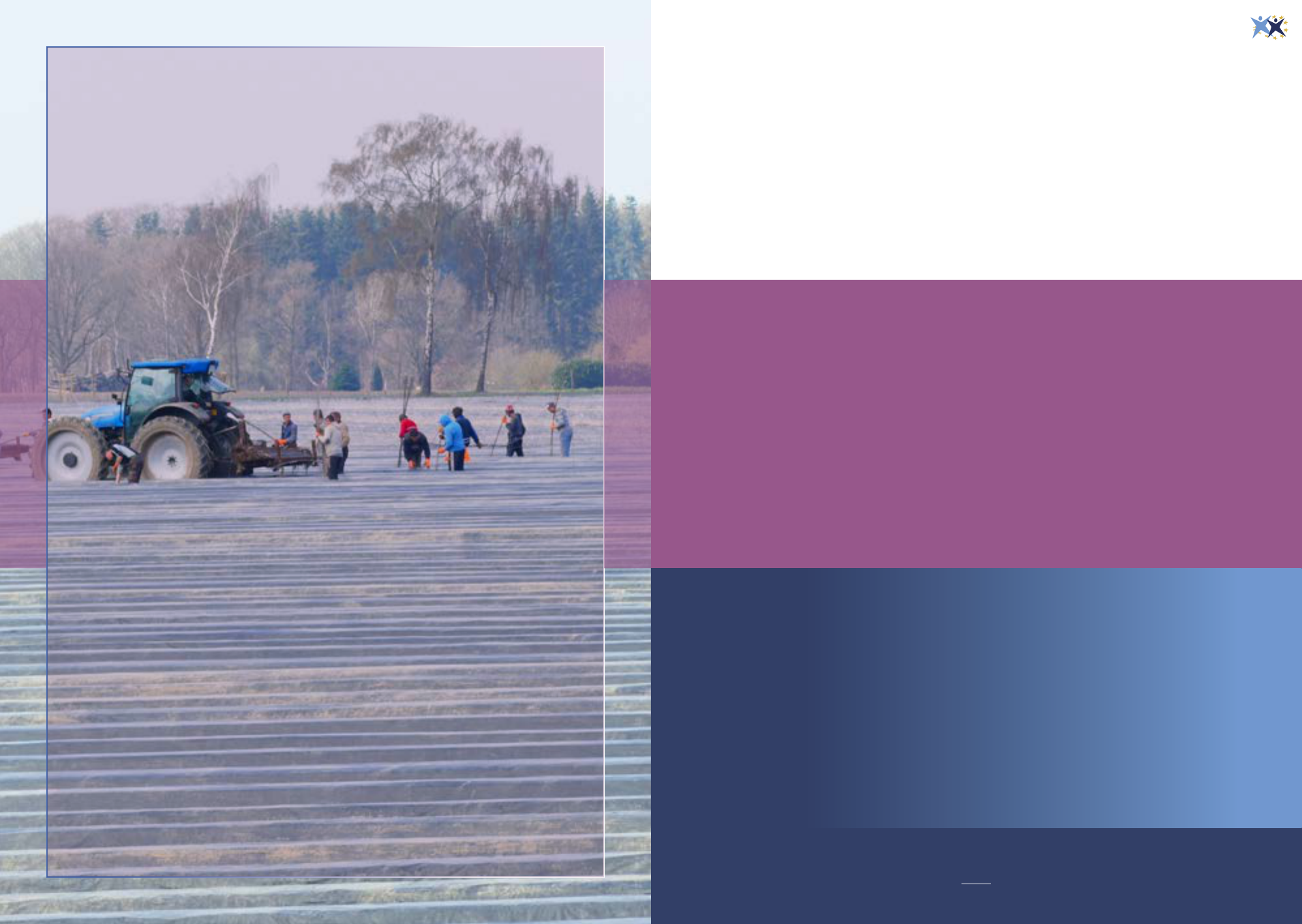
25
POLICIES AND PROCEDURES FOR
SEASONAL WORK IN BELGIUM
03
ATTRACTING AND PROTECTING THE
RIGHTS OF SEASONAL WORKERS IN BELGIUM

2726
as a shortage occupation, the Walloon
Region also exempts seasonable work-
ers under the Directive from the labour
market test.
In Flanders, a similar shortage occupa-
tions list for middle-skilled workers, which
includes occupations in the construction,
transportation and health care sec-
tors, is applicable since January 2019.
36
The labour market test has been waived
for workers mentioned on this list. In
Flanders, seasonable workers are not
considered to be part of these categories
and are still subject to the labour market
testing.
The Brussels-Capital Region and the
German-speaking Community also have
shortage occupation lists, yet these lists
only exempt workers from third countries
from the labour market testing if they
have obtained the EU long-term residen-
cy status in accordance with EC Directive
2003/109/CE.
37
The labour market test-
ing therefore also applies to seasonal
workers in the Brussels-Capital Region
and German-speaking Community. In the
latter, a quota is also provided for under
the applicable regulation, but no annual
quota had been set in practice at the time
of writing of this study.
Before the implementation of the
Directive and its entry into force on 1
September 2019, there was no specic
scheme in place for the entry and stay of
seasonal workers from third countries.
Until today, Belgium does not rely on
seasonal workers from third countries
to ll its labour market needs. The small
number of work authorisations issued in
the Flemish Region under the Directive
(110 between 1 September 2019 and
27 May 2020) and the lack of season-
al work permit applications in the other
regions since the implementation of the
Directive on 1 September 2019 illustrate
this fact (see Section 2).
The Flemish Region and Walloon Region
conrmed that the majority of seasonal
workers are in fact nationals from other
EU Member States. The Walloon Region
noted that since nationals from Bulgaria,
Poland and Romania have access to the
Belgian job market, no signicant num-
ber of work authorisation applications
have been led for seasonal work in Bel-
gium in the past years.
According to the Walloon Federation
of Agriculture (Fédération Wallonne de
l’Agriculture, FWA), the current number
of seasonal workers coming from other
EU Member States is high enough to ll
the country’s labour market needs. The
FWA stated that most farmers encounter
no problems in nding seasonal workers
in other EU Member States and that the
administrative burden related to the sea-
sonal work permit application process
usually deters farmers from hiring work-
ers from third countries.
Unlike other Member States, Belgium did
not develop specic migration policies
to attract seasonal workers from third
countries. In accordance with the Direc-
tive, it did however set up a framework
with regard to the fees and duration of
the procedure, the application of labour
market tests, the facilitation of re-entry of
seasonal workers and the conditions for
a change of status. In addition to these
procedural aspects, this section also dis-
cusses the relevant actors in promoting
seasonal work and the information pro-
vided to employers.
3.1.
IMPORTANCE OF
SEASONAL WORKERS
FOR THE LABOUR MARKET
In Belgium, the entry and stay of sea-
sonal workers from third-countries is not
part of the overall migration policies, the
focus being primarily on other categories
of third-country national workers.
Historically the overall federal migration
policy essentially aimed at attracting
highly-skilled workers.
34
However, since
economic migration became a region-
al competence, each region started to
develop its own migration policy. The
recent changes in the policies of both the
Flemish and the Walloon Regions show
a rst opening towards middle-skilled
workers.
As a general rule, companies wishing to
employ low- or middle-skilled workers
from third countries in Belgium need to
pass a labour market test.
Since June 2019, the Minister for
employment of the Walloon Region
publishes yearly a list of shortage occu-
pations for middle-skilled workers for
which employers no longer need to prove
that they could not nd a suitable candi-
date within a reasonable period of time.
35
The list, applicable since 12 Septem-
ber 2019, includes occupations in the
IT, maintenance and construction sec-
tors. Although seasonal work is not listed
POLICIES AND PROCEDURES FOR SEASONAL WORK IN BELGIUMPOLICIES AND PROCEDURES FOR SEASONAL WORK IN BELGIUM
36. Art. 18 §2 Decision of 7 December 2018 of the Flemish Government implementing the Law of 30 April 1999 on the employment
of foreign workers, Belgian Ofcial Gazette, 21 December 2018.
37. Art. 38 septies of the Royal Decree of 9 June 1999 implementing the Law of 30 April 1999 relating to the occupation of foreign
workers, Belgian Ofcial Gazette, 26 June 1999.
34. EMN, Determining labour shortages and the need for labour migration from third countries in Belgium, 2015, p. 189, https://
ec.europa.eu/home-affairs/sites/homeaffairs/les/what-we-do/networks/european_migration_network/reports/docs/emn-stud-
ies/emn_labour_shortages_synthesis__nal.pdf.
35. Art. 2 §3 of Decision of 16 May 2019 of the Walloon Government relating to the occupation of foreign workers and repealing the
Royal Decree of 9 June 1999 implementing the Law of 30 April 1999 relating to the occupation of foreign workers, Belgian Ofcial
Gazette, 19 June 2019.

2928
3.3.
LABOUR MARKET TEST
In the Flemish Region, the Brussels-Cap-
ital Region and the German speaking
community, the respective Decisions
provide that a labour market test applies
to the seasonal workers covered by the
Directive. Employers must therefore
demonstrate that they cannot nd a
suitable candidate within a reasonable
timeframe in the Belgian and European
labour market. Wallonia decided not to
apply a labour market test to seasonal
workers covered by the Directive.
3.4.
FACILITATION OF RE-ENTRY
45
Belgium has adopted measures to facili-
tate the re-entry of seasonal workers.
According to Article 17 of the Executing
Cooperation Agreement and the Immi-
gration Act, if the third-country national
applying for a single permit for seasonal
work has been employed as a season-
al worker in Belgium over the past ve
years and has complied with the appli-
cable regulations during their previous
stay, the decision on their permit applica-
tion must be taken within 60 days.
46
This
provision is a partial transposition of Arti-
cle 16 of the Seasonal Workers Directive,
which provides that Member States shall
facilitate re-entry of third-country nation-
als who were admitted to that Member
State as seasonal workers at least once
within the previous ve years, and who
fully respected the conditions applicable
to seasonal workers under this Directive
during each of their stays. Article 16,
2 (c) of the Directive provides that the
facilitation may include an accelerated
procedure leading to a decision on the
application for a worker permit for sea-
sonal work or a long stay visa.
The Immigration Act further states that
when the authorities process a single
permit application for seasonal work,
the fact that the applicant has been
employed as a seasonal worker in Bel-
gium over the past ve years and has
complied with the regulations applicable
to seasonal workers during their previous
3.2.
FEES AND DURATION
OF THE PROCEDURE
38
In 2018, prior to the transposition of the
Directive, the average processing time
for work permit applications for seasonal
work in Flanders was 40,7 days: an aver-
age of 16,7 days between the reception
of the application and the start of the
processing, and an average of 24 days
for the actual processing of the applica-
tion.
The new scheme transposing the Direc-
tive and applicable as of 1 September
2019 provides that a decision on the
single permit application for seasonal
work must be delivered within 90 days
from the notication by the competent
regional authority that the application le
is considered to be complete, i.e. admis-
sible.
39
However, it should be noted that
there are no legal time limits for the initial
decision on the admissibility of the case
by the regional authority, with the excep-
tion of the Flemish Region.
40
The applicable legislation also provides
that if the third-country national apply-
ing for a seasonal single permit has
been employed as a seasonal worker
in Belgium over the past ve years, and
has fully complied with the conditions
applicable to seasonal workers during
their previous stay, the decision must be
taken within 60 instead of 90 days.
41
For
renewal as well as extension applica-
tions, a decision must be delivered within
30 days from the notication from the
competent authority that the application
le is complete.
42
As regards the cost of the application,
a fee of €350 applies to single permit
applications (for stays longer than 90
days) for seasonal work.
43
In addition,
some municipalities apply a fee for the
renewal, extension or replacement of
certain types of residence permits. The
municipal fee is limited to an amount of
€50 and can be levied only once a year.
44
POLICIES AND PROCEDURES FOR SEASONAL WORK IN BELGIUMPOLICIES AND PROCEDURES FOR SEASONAL WORK IN BELGIUM
45. Art. 16 Seasonal Workers Directive.
46. Art. 61/29-4 §4 of the Immigration Act.
38. Art. 18-19 Seasonal Workers Directive.
39. Art. 17 § 1 of the Executing Cooperation Agreement of 6 December 2018; Article 61/29-4 of the Immigration Act.
40. Art. 66 Decision of 7 December 2018 of the Flemish Government implementing the Law of 30 April 1999 on the employment of
foreign workers.
41. Article 17 §2 of the Executing Cooperation Agreement of 6 December 2018.
42. Article 17 §3 of the Executing Cooperation Agreement of 6 December 2018.
43. Article 1/1/1 2° a) of the Royal Decree of 8 October 1981 implementing the Law regarding the entry, residence, settlement and
removal of foreign nationals, Belgian Ofcial Gazette, 27 October 1981 (Royal Decree implementing the Immigration Act).
44. Royal Decree of 5 March 2017 determining the residence permits for which the municipalities can apply fees for their renewal, ex-
tension or replacement and determining the maximum amount mentioned in article 2, § 2, of the Law of 14 March 1968 repealing
the Law relating to the residence taxes of foreigners, coordinated on 12 October 1953, Belgian Ofcial Gazette, 20 March 2017.

3130
3.6.
RELEVANT ACTORS
IN PROMOTING SEASONAL
WORK
Each of the regions in Belgium has an
employment agency: VDAB (Vlaam-
se Dienst voor Arbeidsbemiddeling en
Beroepsopleiding) in Flanders, Actiris in
Brussels, FOREM (Ofce Wallon de la
Formation Professionnelle et de l’Em-
ploi) in Wallonia and ADG (Arbeitsamt
der Deutschsprachigen Gemeinschaft) in
the German-speaking Community. Each
of these public organisms promotes job
offers, including for seasonal work, on
their website.
On 8 April 2020, in an effort to address
the shortage of seasonal workers result-
ing from the Covid-19 outbreak, a group
of representative organisations in the
agriculture and the horticulture sec-
tors in Wallonia
51
launched the website
Jobs Easy-Agri,
52
an online platform to
connect farmers with candidates for
seasonal work. Wallonia conrmed the
success of Jobs Easy-Agri, mentioning
that 507 candidates for seasonal work
had already registered only a couple of
days after its launch
53
Shortly after Wal-
lonia, Flanders launched a similar online
platform called Help De Oogst (“save the
harvest”).
54
It should nevertheless be noted that none
of the abovementioned websites (nor the
ofcial websites of the abovementioned
public organisms for employment) cur-
rently have English versions. They are
therefore not targeting seasonal workers
outside Belgium.
According to the Walloon Federation of
Agriculture, word of mouth is the main
source of the recruitment of foreign
seasonal workers, who represent the
majority of seasonal workers in Belgium
and are mainly from other EU Member
States. The same workers often come
back each season and refer other work-
ers to their employers.
stay must be considered when exam-
ining the application.
47
The Walloon
Region took a step further by providing
that the re-entry of a seasonal worker
who has been employed in the Europe-
an Economic Area as a whole and has
complied with the applicable regulations
should be facilitated.
48
Regarding visa applications more specif-
ically, the Immigration Act provides that
the executive power can adopt measures
derogating from the Immigration Act’s
general provisions to facilitate the deliv-
ery of a visa to third-country nationals
who have been employed as a season-
al worker in Belgium or in another EU
Member State over the past ve years
and who have complied with the regu-
lations applicable to seasonal workers
during their previous stay.
49
3.5.
CHANGE OF STATUS
Third-country nationals in Belgium for
the purpose of seasonal work can apply
for a change of status while they are in
Belgium, assuming that at the time the
application is submitted, the third-coun-
try national is in legal stay in Belgium,
and that the regulation applicable to the
permit they apply for does not prohibit
the applicant from applying while on the
Belgian territory.
As of September 2020, third-country
nationals already staying in Belgium can
only apply for a single permit if they are
holder of a short-term residence permit,
a student permit or a researcher permit.
For other categories of third-country
nationals, applications from the Belgian
territory are no longer possible.
51
POLICIES AND PROCEDURES FOR SEASONAL WORK IN BELGIUMPOLICIES AND PROCEDURES FOR SEASONAL WORK IN BELGIUM
52 https://jobs.easy-agri.com/.
531. https://borsus.wallonie.be/home/presse--actualites/publications/covid-19--507-inscriptions--la-plate-forme-
pour-recruter-du-personnel-saisonnier-rencontre-un-beau-succes.publicationfull.html
54. https://www.vdab.be/helpdeoogst.
47. Art. 61/29-8 §4 of the Immigration Act.
48. Art. 23 Decision of 16 May 2019 of the Walloon Government relating to the occupation of foreign workers and repealing the
Royal Decree of 9 June 1999 implementing the Law of 30 April 1999 relating to the occupation of foreign workers, Belgian Ofcial
Gazette, 19 June 2019.
49. Art. 61/29-3 of the Immigration Act.
50. Art. 61/25-2, §2 Immigration Act, as modied by the Law of 31 July 2020 modifying the Law of 15 December 1980 and the Law
of 6 May 2009, Belgian Ofcial Gazette, 28 August 2020.
51. The Collège des Producteurs, Fédération Wallonne Horticole, Fédération Wallonne de l’Agriculture, FUGEA, Bauernbund and
Unab.

3332
3.7.
INFORMATION PROVIDED TO
EMPLOYERS
All the necessary information regarding
the procedure for hiring seasonal work-
ers from third countries, including the
forms and documents to submit for the
seasonal worker’s work permit applica-
tion, can be found on the ofcial website
of each region:
• For Flanders:
https://www.vlaanderen.be/en/working
• For Wallonia:
https://emploi.wallonie.be
• For the German-speaking Community:
https://www.ostbelgienlive.be
• For Brussels:
http://werk-economie-emploi.brussels
Representative organisations also pro-
vide information on the procedure for
hiring seasonal workers through infor-
mation available on their websites and
their regular publications. In addition,
some of these organisations, such as the
Fédération Wallonne de l’Agriculture in
Wallonia and the Boerenbond in Flan-
ders, provide counselling services to their
members who can address them legal or
human resource-related questions.
POLICIES AND PROCEDURES FOR SEASONAL WORK IN BELGIUMPOLICIES AND PROCEDURES FOR SEASONAL WORK IN BELGIUM
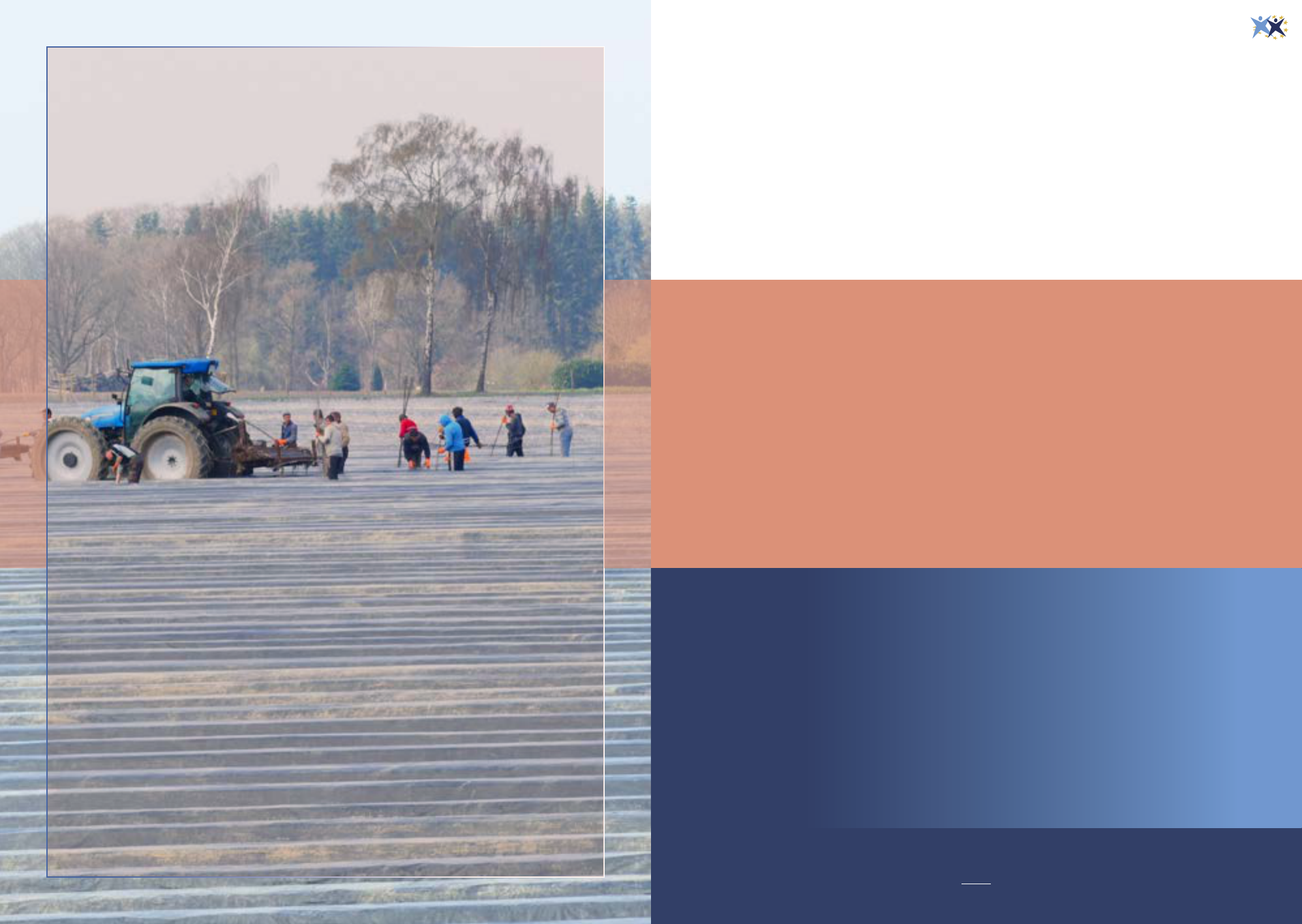
35
PROTECTION AND RIGHTS
OF SEASONAL WORKERS
04
ATTRACTING AND PROTECTING THE
RIGHTS OF SEASONAL WORKERS IN BELGIUM

3736
carry out comparable employment activ-
ities only with regard to family benets. In
Belgium, single permit holders – including
seasonal workers – are not entitled to fam-
ily benets if their single permit is issued
for a maximum period of 6 months.
60
Belgium does not apply any formal
restrictions with regard to unemploy-
ment benets. It is important to note
though that a person should be in legal
stay in order to claim these benets. As
the residence rights of third-country
nationals temporarily staying in Belgium
end simultaneously with the work rights,
these persons would in principle not be
entitled to unemployment benets. Sin-
gle permit holders, whose work rights
have been terminated prior to the expi-
ry of the single permit, are nonetheless
entitled to unemployment benets for a
maximum of 60 days after the termina-
tion of the employment agreement.
61
In addition, in order to be eligible for
unemployment benets in Belgium, a
worker must have worked for a spe-
cic number of days over a determined
period of time preceding the period of
unemployment. The number of days
that a third-country national worked in
the country of origin will in principle not
be taken into account.
62
As a result, the
majority of third-country national work-
ers in Belgium do not benet from the
same rights as national workers when it
comes to unemployment benets.
Finally, while not mentioned as such
in the Directive, it should be noted that
third-country nationals doing season-
al work in Belgium may be particularly
vulnerable to exploitation or human traf-
cking. In 2019, 35 workers in the
agricultural and horticultural sectors, and
31 workers in the hospitality sector have
been identied as potential victims of
trafcking in human beings by the labour
inspectorate.
63
However, these data do
not specify whether these workers were
seasonal workers.
This fourth section describes the rights
of seasonal workers from third countries
in Belgium compared to the rights of
national workers. The section also focus-
es on the key actors and mechanisms
ensuring the protection of these rights.
4.1.
EQUAL TREATMENT
OF SEASONAL WORKERS
55
The Directive provides for equal treat-
ment of seasonal workers and nationals
in relation to nine categories of rights.
56
The provisions include a right to receive
statutory pensions based on previous
employment and acquired in accord-
ance with EU legislation
57
under the
same conditions and at the same rates
as nationals when they move to a third
country. In Belgium, the Royal Decree
of 23 April 2018 set up a framework for
the transfers of pension contributions to
the countries of origin of third-country
national workers.
58
Third-country nation-
als from countries with which Belgium
has concluded a social security agree-
ment can apply through their local social
security authority. Third-country nation-
als from other countries can send an
application by registered mail to the Fed-
eral Pensions Service.
59
According to the Directive, Member
States may however restrict equal
treatment of third-country nationals by
limiting their access to certain of the
rights mentioned, notably family and
unemployment benets, educational and
vocational training and tax benets.
Belgium applies a restriction to the equal
treatment between seasonal workers
from third countries and nationals who
PROTECTION AND RIGHTS OF SEASONAL WORKERSPROTECTION AND RIGHTS OF SEASONAL WORKERS
60. Executing Cooperation Agreement of 17 June 2016 between the Flemish Community, the Walloon Region, the Common Com-
munity Commission and the German-speaking Community concerning the transposition into family law of Directive 2011/98/EU
of the European Parliament and of the Council of 13 December 2011 establishing a single application procedure for the issuance
of a single permit authorizing third-country nationals to reside and work in the territory of a Member State and establishing a
common set of rights for workers from third countries legally residing in a Member State, Belgian Ofcial Gazette, 1 July 2016.
61. Art. 69 of the Royal Decree of 25 November 1991 on the regulation of unemployment, Belgian Ofcial Gazette, 31 December 1991.
62. Exceptions apply to a very limited number of countries, such as Bosnia and Herzegovina and Macedonia, resulting from the appli-
cation of bilateral agreements.
63. Federal Migration Centre Myria, Rapport annuel traite et trac des êtres humains – Jaarverslag mensenhandel en mensensmokkel,
55. Art. 23(1) Seasonal Workers Directive.
56. Seasonal workers are moreover entitled to receive
57. Art. 3 Regulation (EC) No 883/2004 on the coordination of social security systems.
58. Royal Decree of 23 April 2018 modifying Art. 65 of the Royal Decree of 21 December 1967 laying down general rules for the
scheme of retirement and survivor’s pensions, Belgian Ofcial Gazette, 2 May 2018.
59. FR: Service fédéral des pensions; NL: Federale Pensioendienst.

3938
4.3.
KEY ACTORS ENSURING THE
PROTECTION OF RIGHTS
In Belgium, the rights of seasonal work-
ers are protected by a range of actors,
including the labour inspectorates, trade
unions and organisations defending the
rights of foreign nationals.
In terms of cooperation between national
authorities, it should be noted that until
recently the Belgian Immigration Ofce
69
and the national labour authorities
70
used
to cooperate in an ad hoc manner. On 8
May 2018, these authorities decided to
formalise their cooperation by signing
a Cooperation protocol. The authori-
ties agreed to give each other access to
their databases in order to better com-
bat social fraud and human trafcking. In
addition to this exchange of information,
the authorities also agreed to integrate
information related to single permits into
the existing online platform of the Belgian
social security authority
71
for the declara-
tion of foreign workers coming to work
on a temporary basis in Belgium, known
as the ‘Limosa declaration’. The Cooper-
ation protocol specically mentions the
potential usefulness of this last measure
for employers of seasonal workers in the
agricultural and horticultural sectors.
Beyond national authorities, important
actors protecting the rights of seasonal
workers in Belgium are the trade unions
(such as the Fédération générale du tra-
vail de Belgique FGTB Horval, the main
trade union representing workers from
the agriculture, horticulture and hospital-
ity sectors in Belgium) and organisations
defending the rights of foreign nation-
als (such as Fairwork Belgium or
Coordination et initiatives pour réfugiés
et étrangers CIRE).
4.2.
ACCESS TO
ADEQUATE HOUSING
64
Under the Directive, EU Member States
are obliged to require evidence that the
seasonal workers benet from accom-
modation that ensures an adequate
standard of living for the duration of their
stay. For the application of the Directive,
the Belgian legislation refers to the rel-
evant housing legislation to dene the
“adequate standard of living”.
65
Like economic migration, housing is a
regional competence in Belgium. Each
region has a Housing Code laying down
detailed rules related to security, sanita-
tion and equipment to improve the living
conditions of tenants. Each local author-
ity competent for the application of the
Directive therefore refers to its local
Housing Code.
Documents proving the adequate
accommodation must be attached to the
single permit application.
66
The Immi-
gration Ofce is in charge of examining
these documents in the framework of
the residence aspects of the single per-
mit application.
67
In the draft version
of the Royal Decree implementing the
Directive, a provision was added that in
case of doubt on the adequacy of the
accommodation, the Immigration Ofce
could request the opinion of the regional
administration in charge of implementing
the Housing Code. This provision was
removed from the nal version of the
Decree after it was pointed out during
the adoption process that the Executing
Cooperation Agreement did not empow-
er the federal government with the
authority to entrust the regional organ-
isms in charge of applying the Housing
Code with a new mission.
68
PROTECTION AND RIGHTS OF SEASONAL WORKERSPROTECTION AND RIGHTS OF SEASONAL WORKERS
69. FR: Ofce des Etrangers; NL: Dienst Vreemdelingenzaken.
70. FR: Service d'information et de recherche sociale (SIRS); NL: Sociale inlichtingen- en opsporingsdienst (SIOD). The SIRS-SIOD
coordinates the social inspection services in Belgium.
71. FR: Ofce National de Sécurité Sociale (ONSS); NL: Rijksdienst voor Sociale Zekerheid (RSZ).
64 Art. 20 Seasonal Workers Directive.
65. Art. 16 of the Executing Cooperation Agreement of 6 December 2018.
66. Art. 16(3) of the Executing Cooperation Agreement of 6 December 2018; Art. 61/29-8 4° of the Immigration Act.
67. Ibidem.
68. Council of State, Advice 66.622/4, 5 November 2019, p. 11-12 (Art. 105/43).

4140
4.6.
OTHER MECHANISMS
ENSURING THE PROTECTION
OF RIGHTS
Until today, Belgium did not adopt any
specic procedures or mechanisms to
ensure that seasonal workers and their
employers are informed of their rights
and duties.
80
Belgium did not set up any specic pro-
cedures or mechanisms to monitor and
carry out inspections to verify the exer-
cise of seasonal workers’ rights and
compliance with the rules by both the
seasonal workers and their employers.
81
4.4.
COMPLAINTS
AGAINST EMPLOYERS
72
In order to facilitate the lodging of com-
plaints by seasonal workers against
their employer, the Executing Coopera-
tion Agreement provides that seasonal
workers may be represented before the
Belgian Courts by representative organ-
isations of workers, trade unions or any
other institutions or associations aiming
to defend the interests of third-country
nationals in Belgium (subject to the con-
sent of the worker).
73
The Walloon Decision transposing the
Directive explicitly states that the Gov-
ernment must ensure that seasonal
workers have equal access to all meas-
ures related to their protection against
any unfavourable treatment by the
employer resulting from a complaint or a
legal action introduced by them.
74
4.5.
SANCTIONS
AGAINST EMPLOYERS
75
The Walloon Region introduced a spe-
cic sanction for employers who failed
to full their obligations toward seasonal
workers. Its Decision provides that if the
authorisation for the purpose of seasonal
work is withdrawn, the employer shall be
liable to pay compensation to the worker.
Any liability shall cover any outstanding
obligations which the employer would
have had to respect if the authorisation
for the purpose of seasonal work had not
been withdrawn.
76
Brussels, Flanders and the Ger-
man-speaking Community did not put
in place any specic sanction against
employers who did not comply with
their duties under the Directive. Only
the general provisions of the Belgian
Social Penal Code, including the spe-
cic sanctions in respect of the refusal
or withdrawal of permits, apply. For
instance, according to the Social Penal
Code, an employer who does not respect
the limitations of the work authorisation,
such as the duration of the work, or who
employs personnel whose authorisa-
tion has been withdrawn, can receive an
administrative ne between €400 and
€4 000 or be condemned to pay a crim-
inal ne between €800 and €8 000,
77
to
be multiplied by 8 pursuant to the Law of
5 March 1952 relating to the additional
decimals
78
on criminal nes.
79
PROTECTION AND RIGHTS OF SEASONAL WORKERSPROTECTION AND RIGHTS OF SEASONAL WORKERS
76. Art. 22 Decision of 16 May 2019 of the Walloon Government relating to the occupation of foreign workers and repealing the
Royal Decree of 9 June 1999 implementing the Law of 30 April 1999 relating to the occupation of foreign workers, Belgian Ofcial
Gazette, 19 June 2019.
77. Art. 175 (2) Belgian Social Penal Code.
78. FR: opdécimes; NL: opdeciemen.
79. Art. 1 Law of 5 March 1952 relating to the additional decimals on criminal nes, Belgian Ofcial Gazette, 3 April 1952.
80. Art. 11 Seasonal Workers Directive.
81. Art. 24 Seasonal Workers Directive.
72. Art. 25 Seasonal Workers Directive.
73. Art. 23 of the Executing Cooperation Agreement of 6 December 2018.
74. Art. 25 Decision of 16 May 2019 of the Walloon Government relating to the occupation of foreign workers and repealing the
Royal Decree of 9 June 1999 implementing the Law of 30 April 1999 relating to the occupation of foreign workers, Belgian Ofcial
Gazette, 19 June 2019.
75. Art. 17 Seasonal Workers Directive.
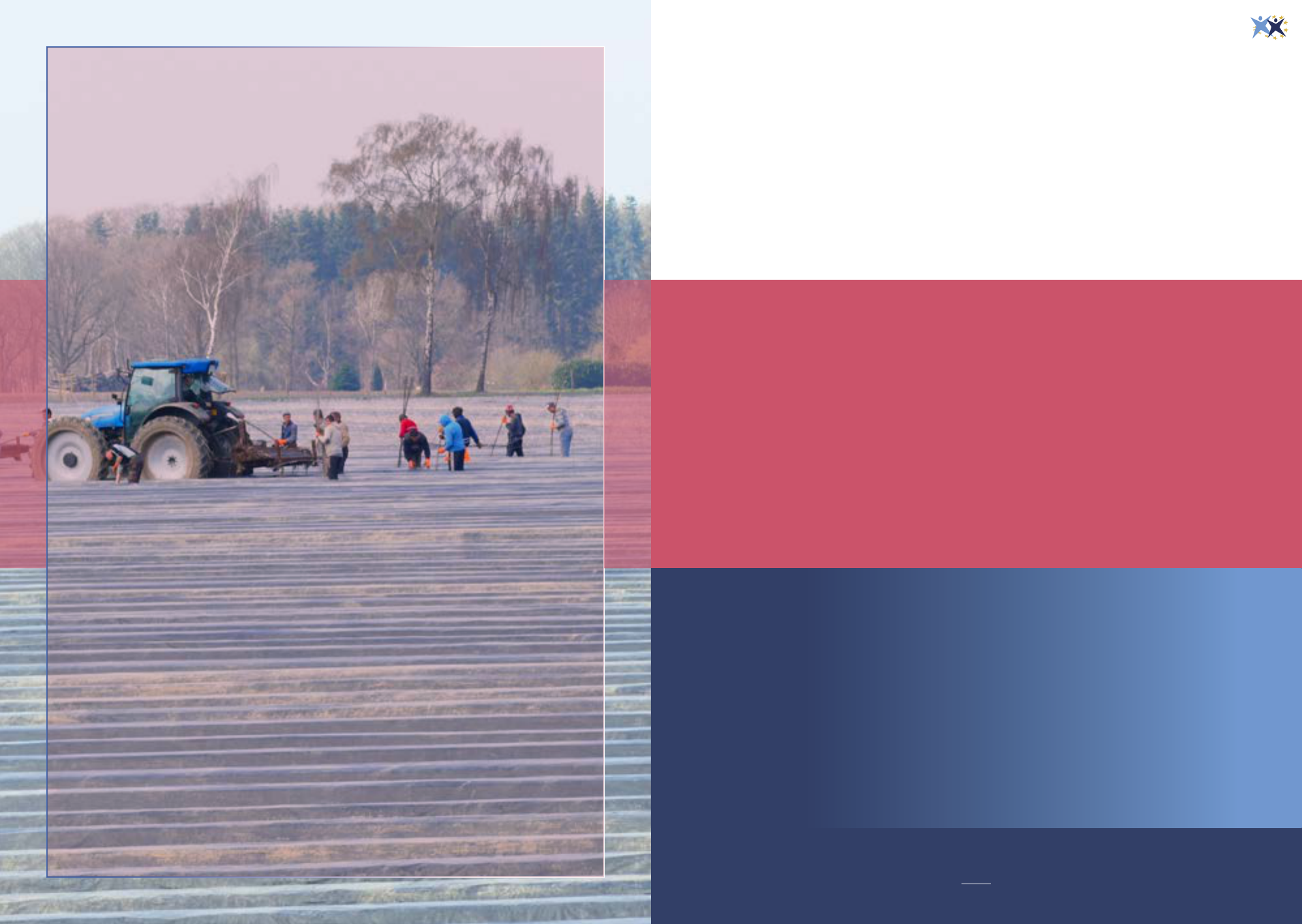
43
CONCLUSIONS
05
ATTRACTING AND PROTECTING THE
RIGHTS OF SEASONAL WORKERS IN BELGIUM

4544
ly high enough to ll the country’s labour
market needs, and the administrative
burden related to the work and single
permit application process usually deters
farmers from hiring seasonal workers
from third countries.
However, markets are subject to change
and the workforce can uctuate. If the
number of seasonal workers availa-
ble from other EU member states come
to decrease in the future, the Directive
could come to play a more important role.
The Directive entered into force in Bel-
gium only on 1 September 2019. At
the time of the drafting of this study,
Belgium had not yet admitted any
third-country seasonal worker under
the Directive, making it difcult to fully
assess its transposition. Nevertheless,
some observations can already be made.
It can rst be argued that the freedom
given to Member States to list the sec-
tors to which the Directive will apply can
result in a situation where the Directive is
formally transposed into the legislation,
but not applied in practice. The Brussels
Region, which has decided that only the
agriculture sector will be covered by the
Directive while this economic sector is
not active in the region (unlike, for exam-
ple, the hospitality sector, which is not
covered in the region by the Directive)
can be cited as an example.
As regards the protection of seasonal
workers’ rights, Belgium has not yet fully
implemented some of the Directive’s pro-
visions. The legislation currently in place
does not provide for sanctions such as
the exclusion of employers who are in
serious breach of their obligations under
the Directive from employing seasonal
workers, as required by Article 17 (1) of
the Directive. Only Wallonia provides for
the specic sanction under Article 17 (2)
of the Directive, namely the liability to pay
compensation to the seasonal worker if
the authorisation is withdrawn in specic
circumstances listed under Article 9 (2)
and points (b), (c) and (d) of Article 9 (3)
of the Directive. Brussels, Flanders and
the German-speaking Community have
not put in place any specic sanction
against employers who have not fullled
their duties under the Directive. Only the
general provisions of the Belgian Social
Penal Code and the general sanctions
in respect of refusal or withdrawal of
work permits apply. In addition, Belgium
does not have any specic procedures or
mechanisms in place to monitor, assess
and carry out inspections to prevent
abuses and to sanction infringements of
the Directive, as prescribed by Article 24
of the Directive.
Although each region in Belgium has
different needs and consequently differ-
ent employment policies, it can be safely
predicted that in the nearby future, the
impact of the Seasonal Workers Directive
in Belgium will be limited. At this time,
Belgium does not rely on seasonal work-
ers from third countries to ll its labour
market needs. The majority of seasonal
workers in Belgium are foreigners com-
ing from other EU Member States, mainly
from Bulgaria, Poland and Romania. The
Walloon Region conrmed that no sig-
nicant number of work authorisation
applications have been led since Bul-
garia and Romania benet from the EU
freedom of movement and have access
to the EU job market. According to sec-
torial representatives such as the FWA,
the number of seasonal workers coming
from other EU Member States is usual-
CONCLUSIONSCONCLUSIONS
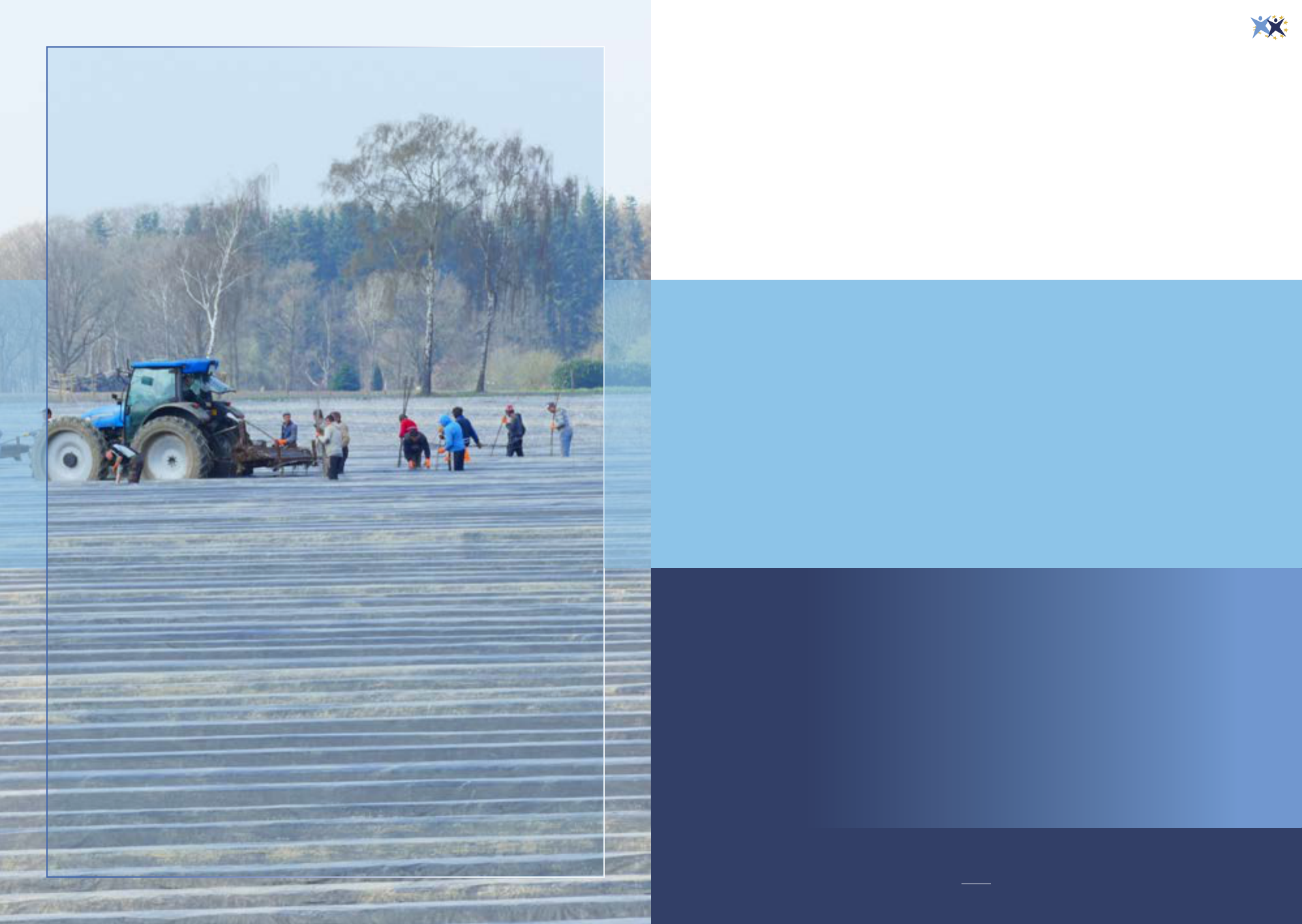
47
ANNEXES
ATTRACTING AND PROTECTING THE
RIGHTS OF SEASONAL WORKERS IN BELGIUM

4948
ANNEXESANNEXES
ANNEX A:
REFERENCES
LEGISLATION
European
Directive 2014/36/EU of the European Parliament and of the Council of 26 February
2014 on the conditions of entry and stay of third-country nationals for the purpose of
employment as seasonal workers, Ofcial Journal of the European Union, 28 March
2014.
Federal
Law of 31 July 2020 modifying the Law of 15 December 1980 and the Law of 6 May
2009, Belgian Ofcial Gazette, 28 August 2020.
Law of 29 May 2020 laying down various urgent tax measures due to the Covid-19
pandemic, Belgian Ofcial Gazette, 11 June 2020.
Law of 5 May 2019 modifying the Law of 15 December 1980 regarding the entry,
residence, settlement and removal of foreign nationals, Belgian Ofcial Gazette, 22
August 2019.
Belgian Social Penal Code of 6 June 2010, Belgian Ofcial Gazette, 1 July 2010.
Law of 15 December 1980 regarding the entry, residence, settlement and removal
of foreign nationals, Belgian Ofcial Gazette, 31 December 1980 (Immigration Act).
Belgian Social Security Act of 27 June 1969, Belgian Ofcial Gazette, 25 July 1969.
Law of 5 March 1952 relating to the additional decimals on criminal nes, Belgian
Ofcial Gazette, 3 April 1952.
Special Powers Decree n. 14 of 27 April 2020 taken in execution of Article 5, § 1, 5°
of the Law of 27 March 2020 granting powers to the King in order to take measures
in the ght against the spread of the coronavirus Covid-19 (II) aimed at ensuring the
proper organization of work in critical sectors, Belgian Ofcial Gazette, 28 April 2020.
Royal Decree n. 5 of 9 April 2020 modifying certain rules applicable in the agricultur-
al and horticultural sectors in the framework of Covid-19 measures, Belgian Ofcial
Gazette, 20 April 2020.
Royal Decree of 23 March 2020 modifying the Royal Decree of 8 October 1981
implementing the Law regarding the entry, residence, settlement and removal of for-
eign nationals, Belgian Ofcial Gazette, 7 May 2020.
Royal Decree of 23 April 2018 modifying Art. 65 of the Royal Decree of 21 December
1967 laying down general rules for the scheme of retirement and survivor’s pensions,
Belgian Ofcial Gazette, 2 May 2018.
Royal Decree of 5 March 2017 determining the residence permits for which the
municipalities can apply fees for their renewal, extension or replacement and deter-
mining the maximum amount mentioned in article 2, § 2, of the Law of 14 March
1968 repealing the Law relating to the residence taxes of foreigners, coordinated on
12 October 1953, Belgian Ofcial Gazette, 20 March 2017.
Royal Decree of 9 June 1999 implementing the Law of 30 April 1999 relating to the
occupation of foreign workers, Belgian Ofcial Gazette, 26 June 1999.
Royal Decree of 25 November 1991 on the regulation of unemployment, Belgian
Ofcial Gazette, 31 December 1991.
Royal Decree of 8 October 1981 implementing the Law regarding the entry, res-
idence, settlement and removal of foreign nationals, Belgian Ofcial Gazette, 27
October 1981 (Royal Decree implementing the Immigration Act).
Ministerial Decision of 3 April 2020 modifying the Ministerial Decision of 23 March
2020 on emergency measures to limit the spread of the Covid-19, Belgian Ofcial
Gazette, 3 April 2020.
Regional
Decision of 23 May 2019 of the German-speaking Community amending the Royal
Decree of 9 June 1999 implementing the Law of 30 April 1999 relating to the occu-
pation of foreign workers, Belgian Ofcial Gazette, 8 July 2019.
Decision of 16 May 2019 of the Government of the Brussels-Capital Region amending the
Royal Decree of 9 June 1999 implementing the Law of 30 April 1999 relating to the occu-
pation of foreign workers, with regard to work authorisation for activities carried out within
the framework of an intra-group transfer, seasonal worker, researcher, trainee, volunteer,
or within the framework of the European Blue Card, Belgian Ofcial Gazette, 4 June 2019.
Decision of 16 May 2019 of the Walloon Government relating to the occupation of foreign
workers and repealing the Royal Decree of 9 June 1999 implementing the Law of 30 April
1999 relating to the occupation of foreign workers, Belgian Ofcial Gazette, 19 June 2019.
Decision of 7 December 2018 of the Flemish Government implementing the Law of
30 April 1999 on the employment of foreign workers, Belgian Ofcial Gazette, 21
December 2018.

5150
ANNEXESANNEXES
Interfederal
Executing Cooperation Agreement of 28 May 2019 between the federal state, the
Walloon Region, the Flemish Region, the Brussels-Capital Region and the Ger-
man-speaking Community implementing the Cooperation agreement of 2 February
2018 between the federal state, the Walloon Region, the Flemish Region, Brus-
sels-Capital Region and the German-speaking Community on the coordination of
policies for the granting of work permits and the granting of residence permits, as
well as norms relating to the employment and stay of foreign workers, Belgian Ofcial
Gazette, 18 July 2019.
Executing Cooperation Agreement of 6 December 2018 between the federal state,
the Walloon Region, the Flemish Region, the Brussels-Capital Region and the Ger-
man-speaking Community implementing the cooperation agreement of 2 February
2018 between the federal state, the Walloon Region, the Flemish Region, Brus-
sels-Capital Region and the German-speaking Community on the coordination of
policies for the granting of work permits and the granting of residence permits, as
well as norms relating to the employment and stay of foreign workers, Belgian Ofcial
Gazette, 18 July 2019.
Executing Cooperation Agreement of 17 June 2016 between the Flemish Community,
the Walloon Region, the Common Community Commission and the German-speak-
ing Community concerning the transposition into family law of Directive 2011/98/
EU of the European Parliament and of the Council of 13 December 2011 establish-
ing a single application procedure for the issuance of a single permit authorizing
third-country nationals to reside and work in the territory of a Member State and
establishing a common set of rights for workers from third countries legally residing
in a Member State, Belgian Ofcial Gazette, 1 July 2016.
PARLIAMENTARY AND POLICY DOCUMENTS
Council of State, Advice 66.622/4, 5 November 2019 on the Draft version of the
Royal Decree of 23 March 2020 modifying the Royal Decree of 8 October 1981
implementing the Law regarding the entry, residence, settlement and removal of for-
eign nationals.
EMN STUDIES
Determining labour shortages and the need for labour migration from third coun-
tries in Belgium, 2015, https://ec.europa.eu/home-affairs/sites/homeaffairs/les/
what-we-do/networks/european_migration_network/reports/docs/emn-studies/
emn_labour_shortages_synthesis__nal.pdf.
OTHER DOCUMENTS
Collective labour agreement of the Joint Committee on agriculture of 9 December
2019.
Collective labour agreement of the Joint Committee for companies in the horticulture
sector of 9 December 2019.
Collective labour agreement for the hospitality sector of 14 April 2008.
European Commission, Legal migration: Commission refers Belgium to the Court
of Justice for failing to provide common rules for non-EU seasonal workers, 19 July
2018, https://ec.europa.eu/commission/presscorner/detail/en/IP_18_4490.
Federal Migration Centre Myria, Rapport annuel traite et trac des êtres humains –
Jaarverslag mensenhandel en mensensmokkel, 2019.
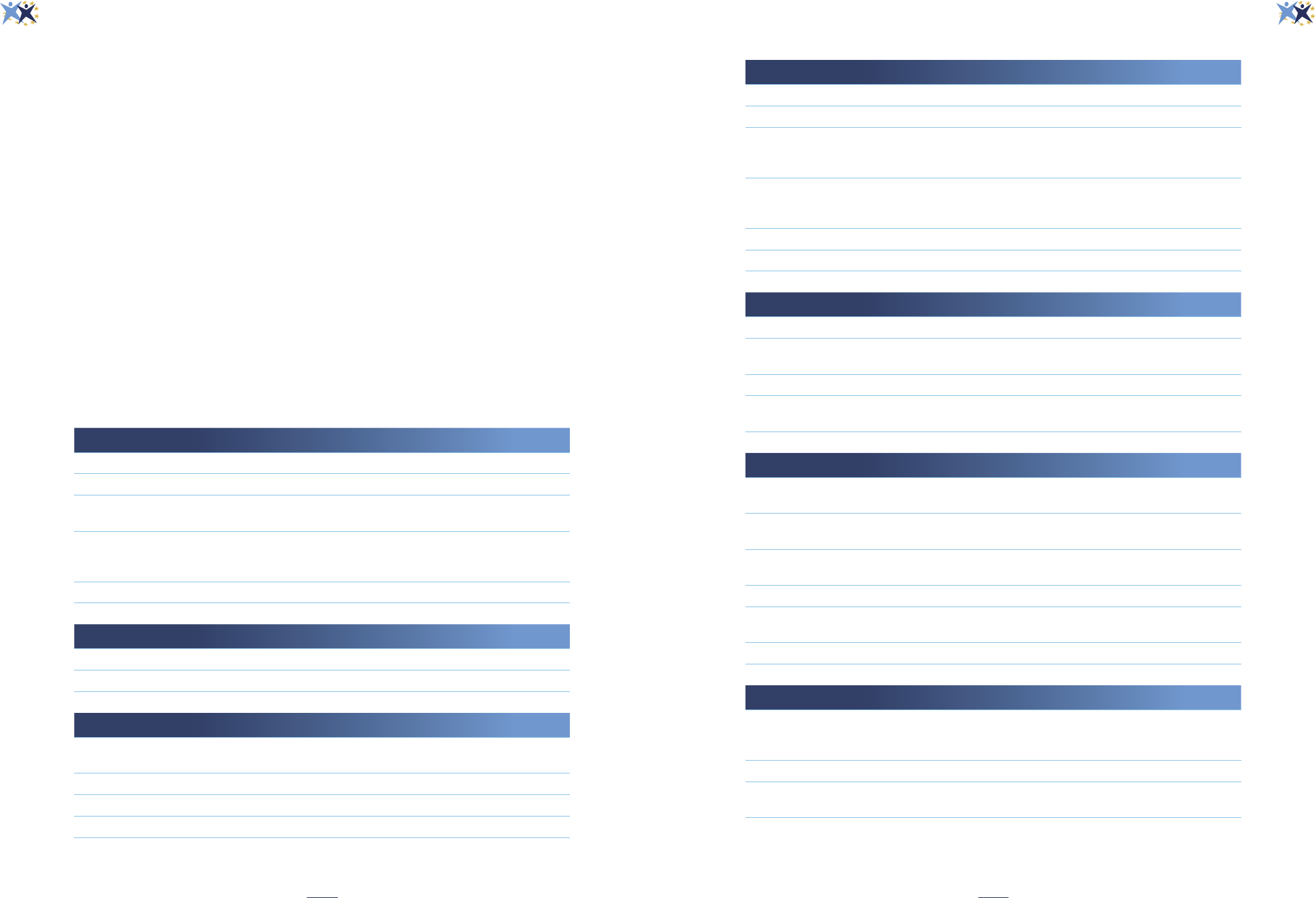
5352
ANNEXESANNEXES
ANNEX B:
STUDIES AND REPORTS OF THE BELGIAN CONTACT POINT
OF THE EMN (2009-2018)
The present annex lists the national studies and reports published by the Belgian
Contact Point of the EMN between 2009 and 2018. The other EMN National Contact
Points (NCPs) produced similar reports on these topics for their (Member) State. For
each study, the EMN Service Provider, in cooperation with the European Commis-
sion and the EMN NCPs, produced a comparative Synthesis Report, which brings
together the main ndings from the national reports and places them within an EU
perspective.
The Belgian studies and reports mentioned below are available for download on
www.emnbelgium.be
The studies and reports from the other NCPs as well as the Synthesis Reports are
available on http://ec.europa.eu/dgs/home-affairs/what-we-do/networks/european_
migration_network/index_en.htm
2009
April 2009 The Organisation of Asylum and Migration Policies in Belgium
June 2009 Annual Report on Asylum and Migration Policy in Belgium – 2008
July 2009 Unaccompanied Minors in Belgium
- Also available in French and Dutch
October 2009 Programmes and Strategies in Belgium Fostering Assisted Voluntary
Return and Reintegration in Third Countries
- Also available in French and Dutch
December 2009 EU and Non-EU Harmonised Protection Statuses in Belgium
2010
January 2010 Annual Report on Asylum and Migration Policy in Belgium – 2009
August 2010 Satisfying Labour Demand Through Migration in Belgium
2011
January 2011 Temporary and Circular Migration in Belgium: Empirical Evidence, Cur-
rent Policy Practice and Future Options
March 2011 Annual Report on Asylum and Migration Policy in Belgium – 2010
May 2011 EU and Non-EU Harmonised Protection Statuses in Belgium (update)
October 2011 Visa Policy as Migration Channel in Belgium
2012
January 2012 Practical Measures for Reducing Irregular Migration in Belgium
March 2012 Annual Report on Asylum and Migration Policy in Belgium – 2011
April 2012 Misuse of the Right to Family Reunication : Marriages of Convenience
and False Declarations of Parenthood in Belgium
- Also available in French and Dutch
September 2012 Establishing Identity for International Protection: Challenges and
Practices in Belgium
- Also available in French and Dutch
September 2012 The Organisation of Migration and Asylum Policies in Belgium (update)
October 2012 Migration of International Students to Belgium, 2000-2012
2013
May 2013 Annual Report on Asylum and Migration Policy in Belgium – 2012
July 2013 Attracting Highly Qualied and Qualied Third-Country Nationals to
Belgium
August 2013 The Organisation of Reception Facilities in Belgium
October 2013 The Identication of Victims of Trafcking in Human Beings in
International Protection and Forced Return Procedures in Belgium
2014
February 2014 Migrant Access to Social Security – Policy and Practice in Belgium
- Also available in French and Dutch
June 2014 Good Practices in the Return and Reintegration of Irregular Migrants:
Belgium’s Entry Bans Policy and Use of Readmission Agreements
June 2014 The Use of Detention and Alternatives to Detention in the Context of
Immigration Policies in Belgium
July 2014 Annual Report on Asylum and Migration Policy in Belgium – 2013
October 2014 Policies, Practices and Data on Unaccompanied Minors in Belgium
(2014 Update)
December 2014 Admitting Third-Country Nationals for Business Purposes in Belgium
2015
June 2015 Determining Labour Shortages and the Need for Labour Migration from
Third Countries in Belgium
- Also available in French
July 2015 Annual Report on Asylum and Migration Policy in Belgium - 2014
August 2015 Dissemination of Information on Voluntary Return: How to Reach
Irregular Migrants not in Contact with the Authorities in Belgium
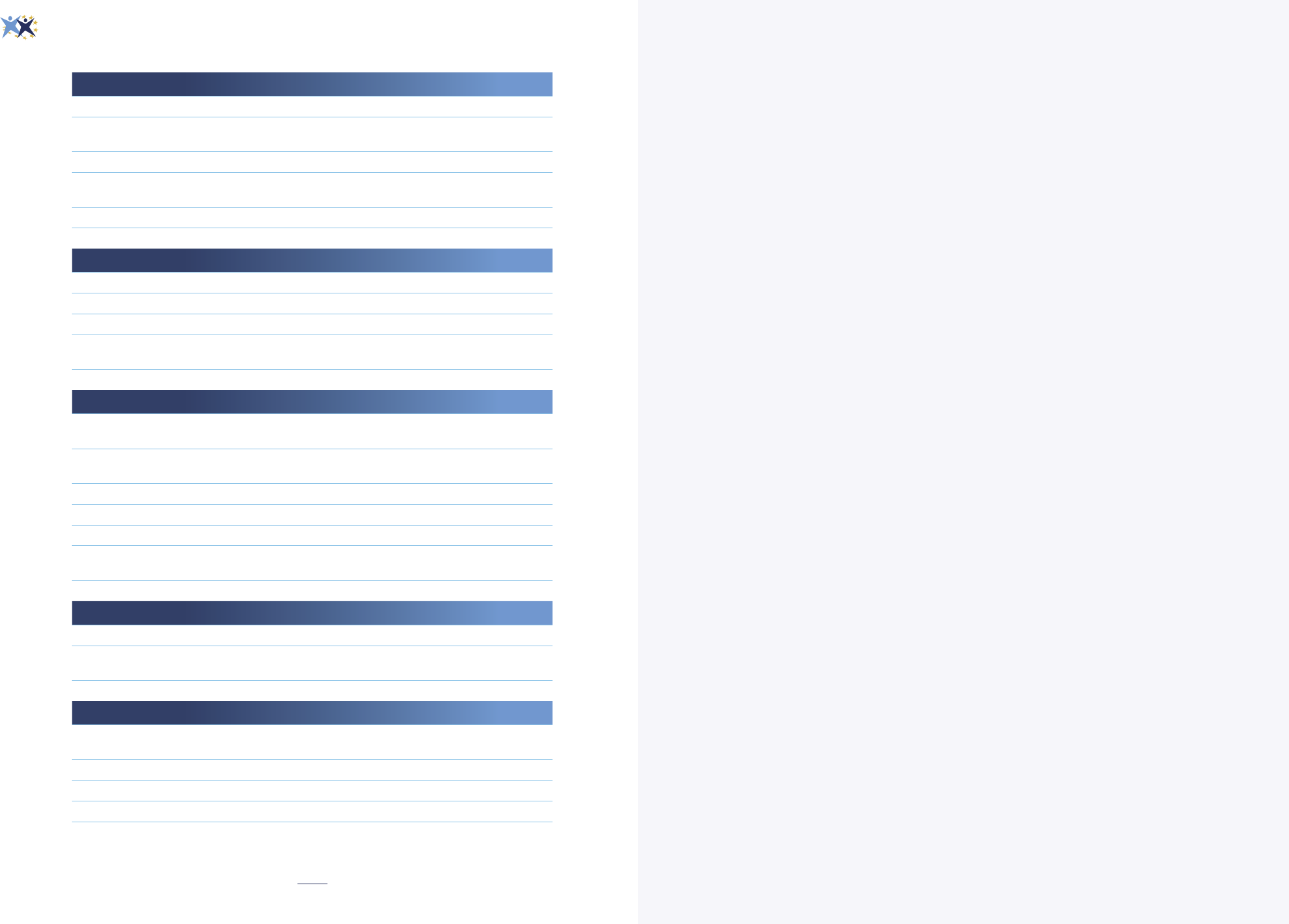
5554
ANNEXESANNEXES
2016
May 2016 Changes in Immigration Status and Purposes of Stay in Belgium
May 2016 Integration of Beneciaries of International Protection into the Labour
Market in Belgium
June 2016 Annual Report on Asylum and Migration Policy in Belgium - 2015
December 2016 Returning Rejected Asylum Seekers:
Challenges and Good Practices in Belgium
December 2016 Resettlement and Humanitarian Admission in Belgium
2017
June 2017 Annual Report on Asylum and Migration Policy in Belgium - 2016
July 2017 Family Reunication of Third Country Nationals in Belgium
July 2017 Illegal Employment of Third Country Nationals in Belgium
December 2017 Challenges and good practices for establishing applicants’ identity
in the migration process in Belgium
2018
May 2018 Changing inux of asylum seekers in 2014-2016:
Belgium’s responses
July 2018 Effectiveness of return in Belgium:
challenges and good practices linked to EU rules and standards
August 2018 Annual report on asylum and migration in Belgium – 2017
September 2018 Labour market integration of third-country nationals in Belgium
September 2018 Impact of visa liberalisation on countries of destination
December 2018 Socio-Economic Prole and Socio-Economic Careers of People Granted
International Protection in Belgium, 2001-2014
2019
June 2019 Annual Report on Asylum and Migration Policy in Belgium – 2018
June 2019 Beneciaries of International Protection Travelling to their Country of
Origin: Challenges, Policies and Practices in Belgium
2020
May 2020 Comparative overview of national protection statuses in Belgium
2010-2019
June 2020 Annual Report on Asylum and Migration Policy in Belgium – 2019
June 2020 Migratory Pathways for Start-ups and Innovative Entrepreneurs in Belgium
July 2020 Pathways to Citizenship in Belgium

EMN Belgium
1 rue de Louvain 1000 Brussels
+32 (0)2 500 23 94
www.emnbelgium.be
Funded by the European Union’s Asylum,
Migration and Integration Fund.
